Like the journal kept by an itinerate journeyman, I am awakened near this morrow at midnight by the flame of the moon torched into my eyes so that I may better hear the sound of a distant voice telling me to Awaken! to Arise! to Advance! ... as my feet tap out the rhythm of a 3-step cadence upon being asked: If I can not hear the toll of a bell ringing out Freedom!... If I can not hear the beat of a drum tapping out Liberty! If I can not hear the trumpet of a bugle signaling Liberation! Though try as I might return to a slumbering abode, I can not because the three sounds approach all the more and I am swept into the tide of those in a march fro which I too am destined to partake of. Thus I awaken, thus I arise, thus I advance with theses words to convey the convection of a current of thought revolving around Capitalism.
Some believe that Capitalism is a virulent disease... so much so that they have incorporated this view into their socio-political philosophy by describing it in terms which may be defined as a necessary evil since they have yet to develop an economic theory which does not enlist some characteristic thereof... which typically refer to some diluted version of Capitalism... like the acceptance of drinking an alcoholic beverage on socially defined "special occasions," or for "medicinal purposes," or some other inclined rationalization. In fact, Democracy is looked upon as a "necessary evil" by Communists who claim that it is a stage that humanity must pass through in order to arrive at a true Communism, though you may never get a Communist to tell you how long the passage through Democracy and then through Socialism will take. Others may at times view Capitalism like a dog or cat or some other pet having been semi-domesticated from a more wild counterpart. And yet others offer some philosophically-based pretense of accepting it in a "live and let live" proposition.
A linear historical exploration of the automobile's ascent may be of assistive value, if even in a truncated model used to illustrate a developmental process of change that was regarded with disdain by owners of horses and buggies and the representative businesses involved with the care and industrialization of the enterprise which describes the advent of the automobile and oil refineries; out of which sprung banking Cartels, Trusts, Conglomerates, Global colonizations, Imperialisms, Nationalistic hegemonies, globalized territorial divisions, social oppression, recession, depression, wars, and numerous other Capitalism-related issues of generation extending between various characters of singularity, duality, and triplicity... amongst which is sometimes overlooked the singularity in a monopolization configured by the incorporation of many divergent occupational endeavors.
 |
 |
 |
 |
 |
 |
 |
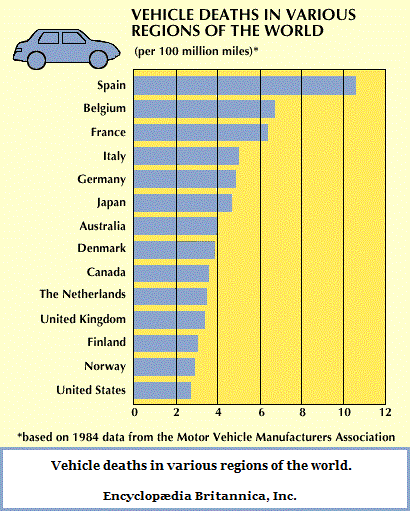 (Developmental Progression to higher rates of death) |
 | |
 |
|
However, despite being an impetus to spur new industry, these few examples are hardly sufficient in describing the many different ways in which Capitalism is used by, for and against the people. For example, it can be used as a barking, biting beast restrained by a leash held in the hands by those who are backed up by laws which enable them to allow their breed of capitalistic beast to be trained as a predator... though it has been taught by some to view it as harmless social accessory by permitting you to pet and feed it.... and perhaps claim a measure of ownership because it wags its tail or purrs in your presence. (Instead of interpreting it as a viscous 'Carnivore' we can call it a three-headed (Banking- Government- Industry) "Capitalvore"... whose heads are inter-changeable with other social entities as conditions warrant. Oh yes, let us not forget to mention that Capitalism has been trained by some puppeteers to dupe you into believing it is the opposite of the owner's true intent to create conditions which calm your fears in order to make you susceptible by allowing your financial vulnerabilities to be exposed like a marionette on a stage of innocent children... but are actually the diminutive representatives of a larger entity always seeking a means and venue to throw its weight around. Many a Carnival Barker uses a side attraction to lull you into a sense of curiosity as a means of setting you up before taking your money or some other property.
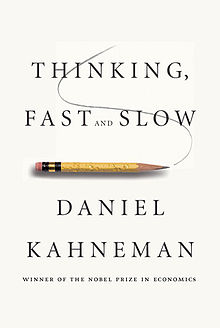
Some prefer to define "Capitalism" in a very narrow sense dealing specifically with money, such as in financing from banks or other investors. Others adopt a generally broader interpretation to include any commerciable product that can be bartered or exchanged. Still others prefer their own selectivity because of a personal interest and perhaps because of an inability to collate large amounts of divergent intellectual commodities (ideas) such as a retail store owner collates different kinds of products. Economists are not known for having a large capacity for a divergency of thinking... and neither is the Nobel prize committee when it is noted that it awarded a prize for Economics in 2002 to Vernon L. Smith and Daniel Kahneman (for his integration of psychological research into economic science)... and that Kahneman's research is represented in the book entitled "Thinking, Fast and Slow" (2011) by which was an intended lay-person's outline of the article "Prospect Theory: An Analysis of Decisions Under Risk" (1979), which he and Amos Tversky had worked on. The point is that the research represents the imagery of a dichotomous mind-set so very characteristic of that found in psychology with its usage of various simplistic dichotomies (which can be viewed as an assortment of primitive cognitive commodities):
The list comes from:
HISTORY AND SYSTEMS OF PSYCHOLOGY,
DR. WARREN R. STREET
- Conscious mentalism - Unconscious mentalism: Emphasis on awareness of mental structure or activity vs. unawareness; coincides with rationalism - irrationalism dichotomy.
- Behaviorism - Mentalism: Proper study of psychological focuses on objective content or on subjective content.
- Determinism - Indeterminism - Nondeterminism: Human events completely determined by antecedents and explicable vs. determined but incompletely explicable vs. not determined.
- Empiricism - Rationalism: Major, if not exclusive source of knowledge is experience vs. reason.
- Functionalism - Structuralism: Psychology should describe adaptive activities vs. elemental classes and contents.
- Mechanism - Vitalism: Activities of living beings completely explicable by physiochemical constituents vs. not so explicable.
- Molecularism - Molarism Small versus Large units of behavior.
- Monism - Dualism: Fundamental principle or entity in universe is of one kind vs. two kinds, mind and matter.
- Nativism - Empiricism: Thought and behavior emerges from innate structures vs. emerges from experiences.
- Subjectivism - Objectivism: Introspective accounts of experience do, or do not, constitute valid data.
- Universalism - Relativism: Is the world an objective entity, the same for everyone, or is it relative to the perceiver?
Let me add some other "two" examples to the above list culled from different sources (some of which you may disagree with), along with an image pointing out a dual dichotomy/duality configuration:
|
|
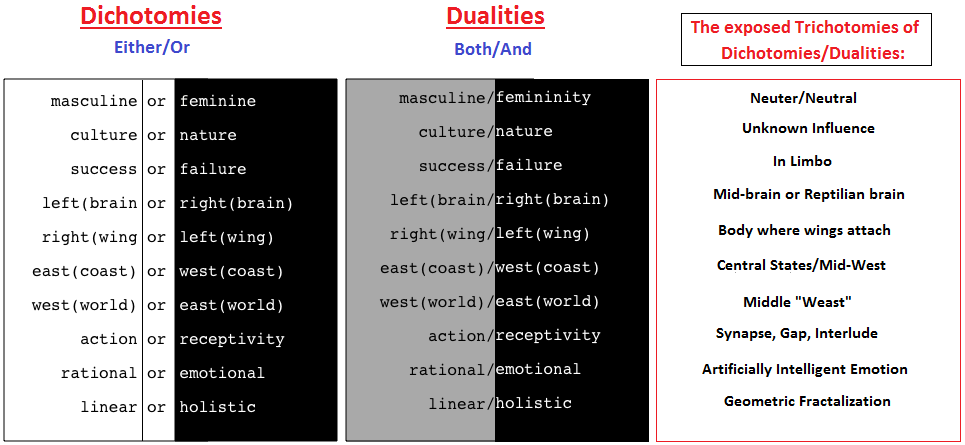 |
|
Some people are primarily interested in one commodity and may diversify into other commodities only when they feel secure in their perceived "ownership" of a given product they want to trade in, be it livestock, precious minerals, grains, energy, etc. Again for some, they prefer to deal in "cash" as their primary interest such as in providing loans which may or may not be tied with other goods, services, and potential profits without having to share away too much of the income. Using a textbook definition of Capitalism can cause some to "stay within the lines" of typical economic discussions in order to give the impression one knows what they are talking about to those who rely on textbook references as well. Yet, in a very broad-based philosophical approach, conventional orientations do not permit the usage of mechanical, biological or alternative models to be used for an exploratory analysis.
Because humanity has a difficult time in definitively classifying Capitalism due to its adaptability to different terrains of exposure... owing to human dispersal like seeds which become attached to clothing while walking along some rural... that is, wild path.

By metaphorically viewing Capitalism in terms of how widespread it has traveled into different environments of varied commercial goods and services, the biological model of how seeds travel is ideally suited for the task in describing how it is communicated and perhaps even describing why it has endured as well as prospered... through what appears to be an internal mutagenic property triggered by external factors.
However, Capitalism does not affect all humans in the same way. Some appear to be more susceptible to its more virulent forms of entangling expression (like weeds) while others have an immunity.
- Do we classify Capitalism as a group of viruses?
- Do we classify Capitalism as a group of bacterias?
- Do we classify Capitalism as an accident, anomaly but in all respects an antagonist?
- Do we classify Capitalism as an injury of the body? Mind? Soul? Is it a crisis of conscience?
- Do we classify Capitalism as a cultural epidemic? world Pandemic? in its early? middle? late? stages of development?
- Do we classify Capitalism as an artificial intelligence?
- Do we classify Capitalism with respect to climate of origination such that we may note different religions have originated in a desert, forest, sub-tropical,
tropical, etc., environment?
- Do we classify Capitalism as a religion that is a subject— subjected to different types of classification depending on the subjective interest of a given subject used as an effort to be objective?
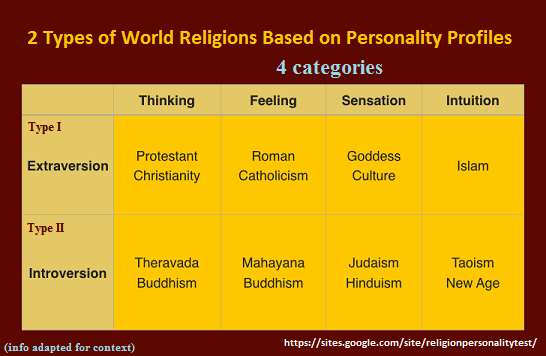 |
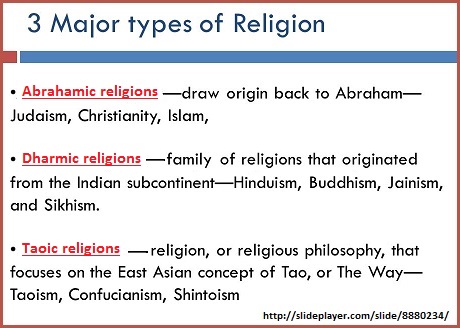 |
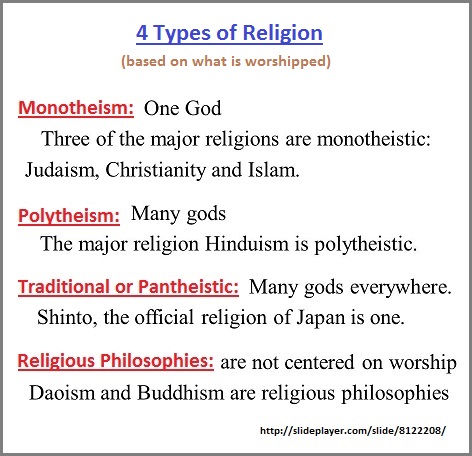 |
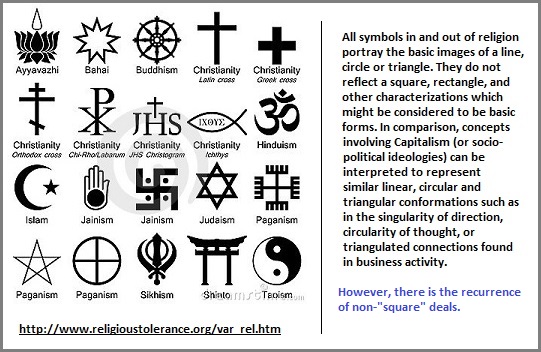
|
- Do we classify Capitalism as a mental disorder such as OCD (obsessive compulsive disorder), schizophrenia (ambivalence), socio/psychotic pathology?
- Do we classify Capitalism as insanity that is difficult to recognize because millions of people are afflicted and form a community?
- Do we classify Capitalism as a path to enlightenment?
- Do we classify Capitalism as a result from one, two, or all diseases?
- Do we classify Capitalism according to the dichotomy of being practical or non-practical?
- Do we classify Capitalism as originating due to one or more efforts to combat a disease, injury or illness?
- Do we classify Capitalism as something good, bad, both or neither?
- Do we classify Capitalism as a beginning life form on a path towards self-awareness and sentience?
- Do we classify Capitalism as the expression of an adaptive response to environmental pollution... and as the environment experiences different kinds and more pollution, Capitalism will become a strange creature in the future than what we of today are experiencing?

- Do we classify Capitalism as being bad because a large population can not adapt to its presence?
- Do we classify Capitalism as a life form that can? can't? be domesticated?
- Do we classify Capitalism as a life form born anew due to... and only to the presence of humans?
- Do we classify Capitalism as a parlor game fad like the inhalation of nitrous oxide (laughing gas) in a former era when it was first discovered?
- Do we classify Capitalism as a hybrid species with or with self-pollination mechanisms?
- Do we classify Capitalism as a original species that is immune to hybridization?
- Do we classify Capitalism as a species whose hybridization occurred intentionally? or serendipitously?
- Do we classify Capitalism according to its associated socio-political ideology?
- Do we classify Capitalism as an expression of democracy, despotism, meritocracy, communism, socialism, libertarianism?
- Do we classify Capitalism as due to a costly hybridization process or a less costly synthetic process?
- Do we classify Capitalism as a species that can produce other varieties of its parent roots, such as seeking to design that which is more robust and viable in all environments?
- Do we classify Capitalism as a mutation?
- Do we classify Capitalism as a species with a mixture of robust and weak traits... in terms like those in which we describe different economies?
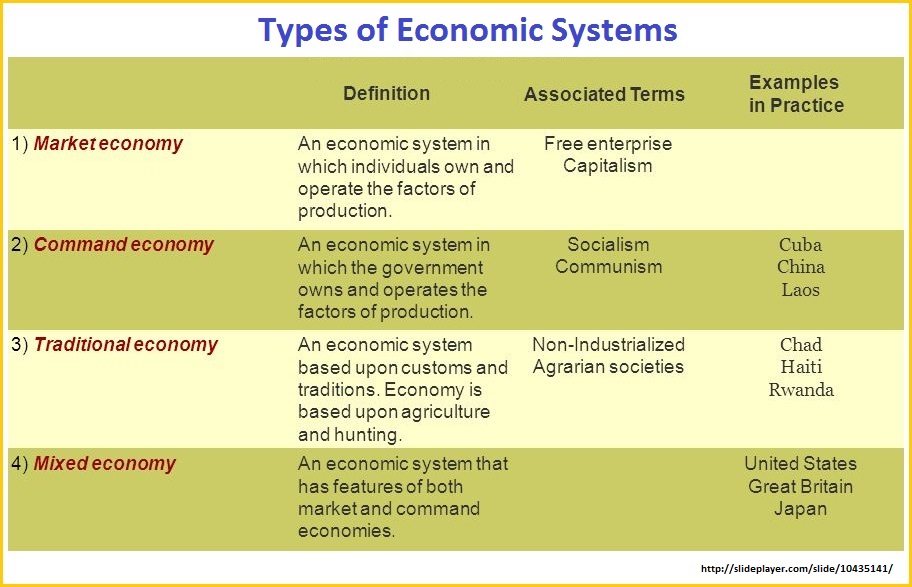
- Does Capitalism have its own relative DNA type of complimentary amino acids... metaphorically accessible to a similar analytical application?
- Can we apply a relatively similar type of analysis to Capitalism as we might the biology of a life form?
- Does Capitalism represent controlled and/or uncontrolled breeding conditions?
- Can Capitalism be analyzed by way of its own respective DNA?
- Do we classify Capitalism as a hybrid species whose yield rates are or will soon be maximized because limitations of growth are imposed due to dwindling resources or some other factor?
- Do we classify Capitalism as a species that can only be pollinated by a specific type of person... like honey bees and flowers?
- Is the present form of Capitalism a virulent form of itself?... a useful species that is sick?
- Has Capitalism become sick due to an exposure to a sick species such as humanity, or human forms of diseased government?
- Is the present practice(s) of Capitalism a diseased state caused by diseased conditions or a diseased carrier?
- Is Capitalism the way it is because of an over-indulgence by humans? If all things are poisons depending on dosage, must the usage of Capitalism be restricted like a narcotic, criminal behavior, etc...?
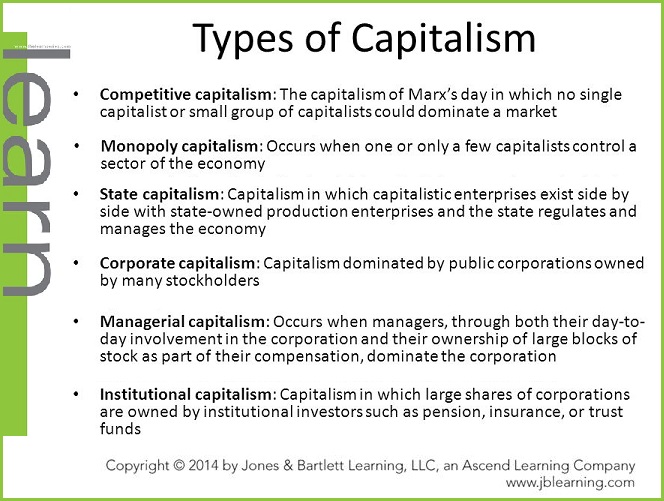
- Do we classify Capitalism as a sensitive species requiring a specific cultural environment?
- Do we classify Capitalism as a weed selectively chosen by governments whose functional formulas are corrupted?
- Do we classify Capitalism with a mechanical model of interpretation?
- Do we classify Capitalism with a computer model of interpretation?
- Do we classify Capitalism according to its obvious sea-shell trading primivity and recognized as a type of cognitive currency?
- Do we classify Capitalism (and all forms of economic systems... if not all socio-political theories and religious beliefs) as a type of game theory?
- Do we classify Capitalism with a molecular, atomic particle or planetary system model?
- Do we classify Capitalism as an evolutionary life form feeding off of humans who represent a type of nourishment being saved up over centuries?
- Is Capitalism a life form having attached itself in a symbiotic relationship with humans and this represents a type of economy?
- Are some life-forms more susceptible to forming a symbiotic relationship such as with humans?
- Are only some humans susceptible to the varying degrees— mild, inter-mediary- intense— of Capitalism's effects?
- Are there one or more forms of Capitalism which occur in non-life form populations?
- Did/does Capitalism exist in crude formulas identifiable in jungle primates, aquatic forms of life, insects, plants, or other animals? (In other words,
does a market/trading economy exist amongst other life forms other than what might be construed in a symbiotic sense? What sort of relative "economy" exists
amongst a bee, ant or termite colony?)
- Is the word "Capitalism" an example of mis-naming the existence of something like a plague whose cause has been misinterpreted and said to be due to an
evil spirit such that many speak of "market forces" or the "magic" of the market place or the "unknowns," and "unpredictables" whereby those who consistently
guess correctly about a given activity are to be viewed as a soothsayer or some other "special" person with "special" insight only because one or another
economic practice is embraced as a type of religion?
- Are all socio-political theories and religious beliefs examples of mislabeled observations concerning biological activity and the environment?
Here is a generalized view of Capitalism's dispersal into one area called "Futures Market":
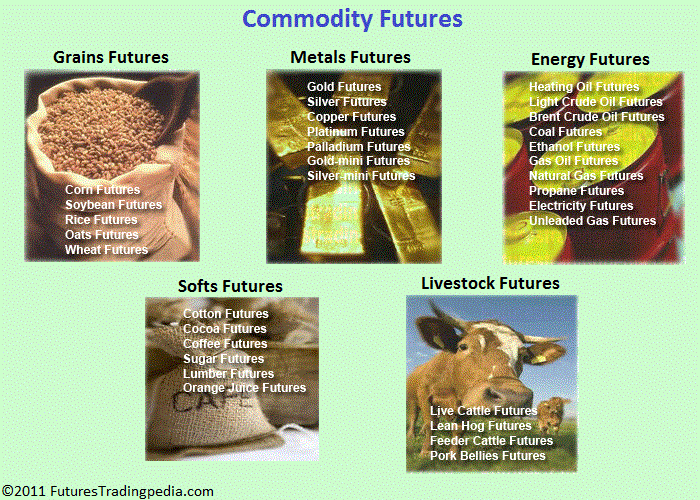
Just because Capitalism was named by those with a given subject's preoccupation doesn't mean they have correctly identified it... and by naming an observation of behavior as "capitalism", they have manufactured a respective definition which interferes with the ability of most people of looking at the behavior in any other way. The Economists of today are like the alchemists of old attempting to transmute the raw ore of their ideas into gold or something else that is precious and others will buy into. With respect to the conventional sense of a plague or disease which causes harm to humans, the fact that Capitalism does produce many different types of symptomatic social problems describes an unrecognized state of disease... or the inception of a life form from which later generations of people will be able to make better use of through an exercise of domestication and cross-breeding. Just because millions appear to be unaffected by the dire consequences of the Capitalism epidemic outbreak, or exhibit symptoms that are becoming socially accepted attributes (like Australians who now embrace their criminal heritage), does not mean there are not millions who are being adversely afflicted. If a large population interpret their seeming mutually beneficial symbiotic relationship with Capitalism as an indication of their uniqueness, and such individuals inhabit the corridors of Legislative halls, those who are direly afflicted do not have a voice in the government to speak for them.
Yet, it may not be so important to place a definitive name onto Capitalism because of its effects, even though some would prefer to label it a disease, wild animal, or mutated spirit. If it is a disease, we must look for a cure or at least a means by which it can be isolated. If it is an animal, we must deduce whether it can ever be truly domesticate or will it forever be guided by instincts related to a "survival of the fittest" perspective. And if it be a mutated form of spirituality, the who, the when, the what, the where and the why might well be an assigned task to accomplish. But it is a task left up to those of us who are not (unduly) afflicted with the fever and other symptoms of Capitalism. We can not expect those who are so afflicted with a state of Capitalistic Euphoria or some other intoxicated state to be of much assistance when they are unable to see any problems they are participating in... like an absentee owner who is only interested in the profits from a crop on their land and not the day-to-day problems of seeding, watering, pest removal, harvesting, etc... So many have become addicted to Capitalism... in one or another form, that we may be left with little choice but to dispense with them in the most humane way we can.
Whereas we can trace out the origin of when certain human behaviors were defined as an expression of Capitalism, such as an event which followed on the heels of the old disease called Feudalism, different words might be used to describe earlier (fledgling) forms. Yet, if Capitalism is thought to be the result of a "natural" growth process, are we then to describe all those who are presently afflicted to be part of some larger "natural" order of things that need to play out, in order that some supposed overall general level of immunity from the ill-effects of Capitalism will no longer trouble humanity? Or does an immunity from certain forms of impoverishment, privation and austerity necessarily lead to the generation of more virulent forms of Capitalism as it mutates in response to societal attempts to inoculate humanity against it? Is there an underlying arms race that we are unaware of? If Capitalism breeds ill social effects and societies attempt to create government policy vaccines against recurring impoverishments, is there some internal mechanism which causes Capitalism to seek out some developmental advantage because impoverishment is the primary way in which it is designed to grow? Does Capitalisms live by a "kill or be killed" rule-of-thumb and that only by eliminating this rule through substitution or otherwise, will we be able to create a better form of Capitalism or create something altogether more beneficial?
In as much as there are those readers who appreciate the effort to explore alternative ideas regarding socially applied perspectives such as Capitalism, some prefer to simply amputate Capitalism and by doing so, think to solve the issues of concern by using a socio-political philosophy that imposes its values of equality onto the lives of everyone. They look upon Capitalism as the origin of itself. They don't want to consider the possibility that it too may be but a symptom of a deeper and more wide-spread disease. They in fact live for the here-and-now and are not concerned with the lives of those in a distant future. Unknowingly, their attitude is a symptom of Capitalism's way of eliminating competitions which arise from within itself... like having the seeds of one's own destruction as a fail-safe... as an excuse to get rid of everything and everyone so that there will be no means of exercising a profitability after Capitalism's demise. It is like a self-pruning mechanism which permits grafting so as to increase its means of propagating itself onto other viable forms of potentiality... like the presence of DNA in almost all life forms. We have seen versions of this in the development of Monopolies, Trusts, Cartels and the usage of genealogical, gardening, sociological, physiological, mathematical, etc., terminology such as "parent company," "sibling offshoots," "investment seedings," major/minor holding company, diffusion, dispersal, merger, appendaged firms, consolidation, corporation, incorporation, conglomerate, horizontal/vertical/diagonal growth, etc.. All of which is simply the usage of other subjects' terminology to label a basic behavior such as "give-and-take"?
Then again, in our present mood of theoretical philosophizing we might want to consider Capitalism as a projected expression of DNA... if not DNA... or even Proteins. While many of us think of DNA in terms of it being expressed in a similarly recurring way from one life form to another, we don't think of it as a living entity that aspires to be more than what it is... and Capitalism as an experimental undertaking in trying to produce a form for one or more of its attributes not easily identifiable through a microscope. Perhaps DNA is an entity that is dreaming (or having a nightmare) and the present Capitalism is the image that has been created, but may well dissipate as soon as DNA wakes up. Like in the old song of "Row, Row, Row your boat" in which it is stated that "life is but a dream", perhaps Capitalism is but a dream (or nightmare) in which humans are simply an attendant characterization. Then again, what if DNA is a dream and life is the nightmare thereof? Though such divergencies can be entertaining in a museful way, they don't really help those whose minds are not readily able to wander such fields of imaginative discourse. In short, they wonder what any of this has to do with Capitalism, since they see Capitalism exactly as it is defined in a textbook and has no other meaning. So let us venture back to the shore upon which many people stand in their conventions of thought processing
Because some of us can readily see the ill effects Capitalism can have on people in their day-to-day struggles within a society that functions like a multi-game assortment of board games which does not allow them to engage in playing the game(s) of Capitalism as an equal... other than as a participating pawn or other auxiliary game piece being used by dominant players who alter and make up rules to serve their interests; we seek to find a model of comprehension which will permit us to devise a means to address the nature of the ill effects. Yet, we ask in earnest: Is Capitalism the cause or a symptom? For example, is impoverishment due to an inequality originating in Capitalism itself, or an inequality already existing in human affairs of a corrupted form of "Representative"-burdened self-government? Is Capitalism the origin of social problems, or it merely allows us to recognize the existence of a flawed form of government which produces the necessary conditions to permit Capitalism to breed? Is the present form of democracy too restrictive for Capitalism's inherent equality to shine through? Is a mechanical or biological best for dissecting Capitalism? Does it represent other than that which we can deduce at face value, or is the search for elucidation the attribution of a complexity where none exists?
Whereas some view Capitalism as THE disease, others view it as a cure for social ills. The social ills which are perceived are interpreted not as symptoms of a disease called Capitalism, but of a disfigured Capitalism caused by poor government design to permit Capitalism from functioning properly. Take for example the following excerpt:
...It is not without interest to observe that even then (late 19th, early 20th centuries) [these: M. Beer, B. Disraeli, J. Chamberlain, C. Rhodes] leading British Bourgeois politicians saw the connection between what might be called the purely economic and the socio-political roots of modern imperialism. Chamberlain advocated imperialism as a "true, wise and economical policy," and pointed particularly to the German, American, and Belgian competition which Great Britain was encountering in the world market. Salvation lies in monopoly, said the capitalists as they formed cartels, syndicates and trusts. Salvation lies in monopoly, echoed the political leaders of the bourgeoisie, hastening to appropriated the parts of the world not yet shared out. And Cecil Rhodes, we are informed by is intimated friend, the journalist Stead, expressed his imperialist views to him in 1895 in the following terms: "I was in the East End of London (a working-class quarter) yesterday and attended a meeting of the unemployed. I listened to the wild speeches, which were just a cry for 'bread! bread!' and on my way home I pondered over the scene and I became more than ever convinced of the importance of imperialism... My cherished idea is a solution for the social problem, i.e., in order to save the 40,000,000 inhabitants of the United Kingdom from a bloody civil war, we colonial statesmen must acquire new lands to settle the surplus population, to provide new markets for the goods produced in the factories and mines. The Empire, as I have always said, is a bread and butter question. If you want to avoid civil war, you must become imperialists." —That was said in 1895 by Cecil Rhodes, millionaire, a king of finance, the man who was mainly responsible for the Anglo-Boer War... Source: Page 352 (Essential Works of Lenin, ISBN 9781481068710) |
 The causes of the war have provoked intense debates among historians and remain as unresolved today as during the war itself. British politicians claimed they were defending their "suzerainty" over the South African Republic (SAR) enshrined in the Pretoria and (disputably) London conventions of 1881 and 1884, respectively. Many historians stress that in reality the contest was for control of the rich Witwatersrand gold-mining complex located in the SAR. It was the largest gold-mining complex in the world at a time when the world's monetary systems, preeminently the British, were increasingly dependent upon gold. Although there were many Uitlanders (foreigners; i.e., non-Dutch/Boer and in this case primarily British) working in the Witwatersrand gold-mining industry, the complex itself was beyond direct British control. Also, the discovery of gold on the Witwatersrand in 1886 allowed the SAR to make progress with modernization efforts and vie with Britain for domination in Southern Africa. South African War Also called Boer War, Second Boer War, or Anglo-Boer War; to Afrikaners, also known as the Second War of Independence. (It was a) war fought from Oct. 11, 1899, to May 31, 1902, between Great Britain and the two Boer (Afrikaner) republics—the South African Republic (Transvaal) and the Orange Free State—resulting in British victory. Although it was the largest and most costly war in which the British engaged between the Napoleonic Wars and World War I (spending more than £200 million), it was fought between wholly unequal protagonists. The total British military strength in Southern Africa reached nearly 500,000 men, whereas the Boers could muster no more than about 88,000. But the British were fighting in a hostile country over difficult terrain, with long lines of communications, while the Boers, mainly on the defensive, were able to use modern rifle fire to good effect at a time when attacking forces had no means of overcoming it. The conflict provided a foretaste of warfare fought with breach-loading rifles and machine guns, with the advantage to the defenders, that was to characterize World War I. Source: "South African War." Encyclopædia Britannica Ultimate Reference Suite, 2013. |
Is an analysis of Capitalism helpful in our attempts to create a better... more uniform system of economics instead of being offhandedly dismissive of Capitalism whose abrupt loss from most societies would create wide-spread panic and needles suffering through privations of goods and services? Can Capitalism be taught new tricks or is its ability to develop a communicative speech of intelligibility for more complex conversations as limited chimpanzees are in adopting human speech? If Capitalism's emergence arose from a disuage of Feudalism, can we not advance beyond Capitalism by putting a stop to it? Yet, would its successor be too complicated for most people to grasp and use on a day-to-day basis? Is developing an economic system of equality the same as a system of paired similarity? For example, would the greater equality be expressed by everyone having a hundred dollars as the maximum allowed, and creating a government system within the hundred dollar maximum? Yet, even if everyone had million dollars as the maximum, would their lives be equal? How do we equalize everyone unless we make clones of one model? And why do we practice a culture which permits one set of behaviors to be valued more so than another? If we are all born equal as some presume, then it is the system which is at fault for creating circumstances which allows one characteristic over another to be valued as having the greater and lesser worth. How do we stop a system of traditions which allow for the classification of different worth values?
If many of us can see the ill effects that a process of "institutionalization" can have on someone who is "brought up in the system", why do we let such a system to continue? Is this the system created by the confluence of wisdom, intelligence and intuition of the majority, or the expression of a few who are permitted to design what they think is fair and proper according to how they can best utilize a given budget? If Institutionalization is so bad, why do we continue to allow ourselves to be subjected to such an Institution creating government? Is it not time for us to put a stop to it? Is it not time to use the system's allowances to break its Will so that the Collective Will of the people can prosper and remove itself from such an undesirable system... without attempting to use reform as a method of personal opportunism?
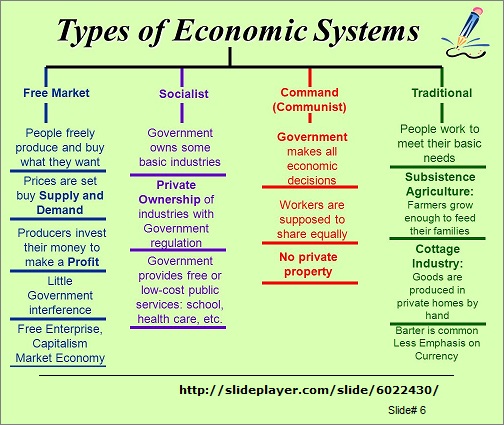
Types of economic systems (textbook versus reality)
Free Market: (Free Enterprise, Capitalism, Market Economy)
- (Text Book) People freely produce and buy what they want
- (Reality) Production can be used by individuals, companies and governments as a means to control market shares in order to create monopolies, trusts, cartels, syndicates; as a bartering tool or political leverage, etc... )
- (Text Book) Prices are set by supply and demand
- (Reality) Prices are manipulated to control market shares, eliminate competition, depress economies, purchasing power of people and nations, etc... They often have nothing to do with "demand" in terms of basic needs. "Demand" can be artificially created by advertising gimmicks, government activities, withholding resources, etc...
- (Text Book) Producers invest their money to make a profit
- (Reality) Many producers hoard their money and do not provide jobs for others. They can also use their money as a tool of manipulation, weapon, and mechanism for interfering in the efforts of others.
- (Text Book) Little Government Interference
- (Reality) In many cases, there is an ongoing "partnership" worked out with one or another politician whose political campaigns are financed by the "investment" of producers to get laws made to favor them. Politicians interfere in order to receive compensations so that they won't interfere.
Socialist economy:
- (Text Book) Government owns some basic industries
- (Reality) Government owns, oversees or has direct control over most industries dealing with basic commodities as an "overseer". The government assumes a responsibility for consumer protection or there would be no need of regulation... because in an ideal society all companies would provide warranties (etc.) without being forced to by law.
- (Text Book) Private ownership of industries with government regulation
- (Reality) It is actually a "partnership" ownership in that government can dictate terms of any given industry "at Will" in terms of an "eminent domain" prerogative of forcing compliance.)
- (Text Book) Government provides free or low-cost public services such as school, roads, libraries, health care, transportation, etc...
- (Reality) Funding for services is compulsory through taxes which are often not equalized between individuals and corporations. Not all services are used by all people and in some cases, there is an attached "user" fee on top of the taxes the people have been forced to pay... very often without the approval of the majority of citizens because the voting system is not set up to identify the collective voice of the people, only the "majority-few" who vote. And even if the people vote against a measure, the government can step in to override the vote of the people if the government thinks that a service is needed. The government can effect an "eminent domain" rationale on anything it wants and the people have no say so whatsoever.
Command (Communist) Economy:
- (Text Book) Government makes all economic decisions
- (Reality) Actually, since many government officials don't have a background in economics, banking, etc., government develops its opinion(s) from the advice from those whose livelihood is intermeshed with the development of the economy through their business activities. Hence, the "government" turns out to be the opinion of those in various businesses who want government policy to advocate their specific interests. The ideals of Communism as an advanced form of government using democracy and socialism as stepping stones, finds it difficult to make the final leap because it can not realistically see past democracy and socialism in any practical sense.
- Workers are supposed to share equally.
- (Reality) Many of us know this doesn't happen because some are greedier than others and others are inclined to suffer through one privation or another for personal reasons. Without a change in the human species itself, the ideals of Communism... or for that matter any socio-political philosophy appears to be doomed to repeat past performances because of the limitations imposed not only by present human physiology/genetics, but the incremental degradation of the planetary system and environment as well.
- (Text Book) No private property.
- (Reality) The "government" becomes the monopolist (autocrat/monocrat of all property and has the final say who gets what and how much during moments of redistributing goods and services. Favoritism abounds regulated by the personal interpretation of whomever is in a position of authority and their ability to get others to go along with them.
Traditional Economy:
- (Text Book) People work to meet their basic needs.
- (Reality) The "basic needs" rule-of-thumb is based on personal preferences unless it becomes authoritatively standardized for one or another purported goal.
Subsistence Agriculture:
- (Text Book) Farmers grow enough to feed their families
- (Reality) But soon learn that they can acquire other things by using excess food to barter with.)
Cottage Industry:
- (Text Book) Goods are produced in private homes by hand.
- (Reality) Unless they are taken from others through raids, gifts, taxes, civil asset forfeiture, rule of eminent domain, colonization, imperialism, divine right, manifest destiny, etc...
- (Text Book) Barter is common- Less emphasis on currency
- (Reality) "Currency" is a relative term used by those in later ages to define a specific substance, whereas actual currency comes in many forms such as verbal agreement, temporary exchanges through borrowing, theft, intimidation, threat, power, love, kindness, etc...)
So, do we have a choice of which economic system to use, or is the present Market Economy dictated by the many millions involved in it? Can it be modified
to be more productive for humanity by instituting government reforms, or are we stuck in a mud hole? What do you think?
Date of Origination: Sunday, 4th-February-2018... 1:39 AM
Date of Initial Posting: Sunday, 18-Februrary-2018... 10:33 AM